Abstract
Nineteen tyrosine auxotrophs of the ciliated protozoan Tetrahymena thermophila have been isolated and biochemically examined. These mutants are defective in the conversion of phenylalanine to tyrosine; this is analogous to the defect that causes phenylketonuria in humans. After nitrosoguanidine mutagenesis and self-fertilization, progeny clones were screened for tyrosine auxotrophy and positively identified by using growth tests and in vivo radiometric assays for phenylalanine-to-tyrosine conversion. Mutants in one complementation group (locus) lacked phenylalanine hydroxylase activity; mutants in three other loci appeared to be deficient in the unconjugated pteridine cofactor that is necessary for the function of the hydroxylase. Another mutant lacked the dihydropteridine reductase activity required to regenerate the reduced form of the pteridine cofactor. Because hydroxylation of tyrosine to dopa and of tryptophan to 5-hydroxytryptophan may require the same cofactor and pterin reductase as phenylalanine hydroxylase, these mutants may also prove useful for the study of the role of catecholamines and serotonin, substances known to be present in Tetrahymena.
Full text
PDF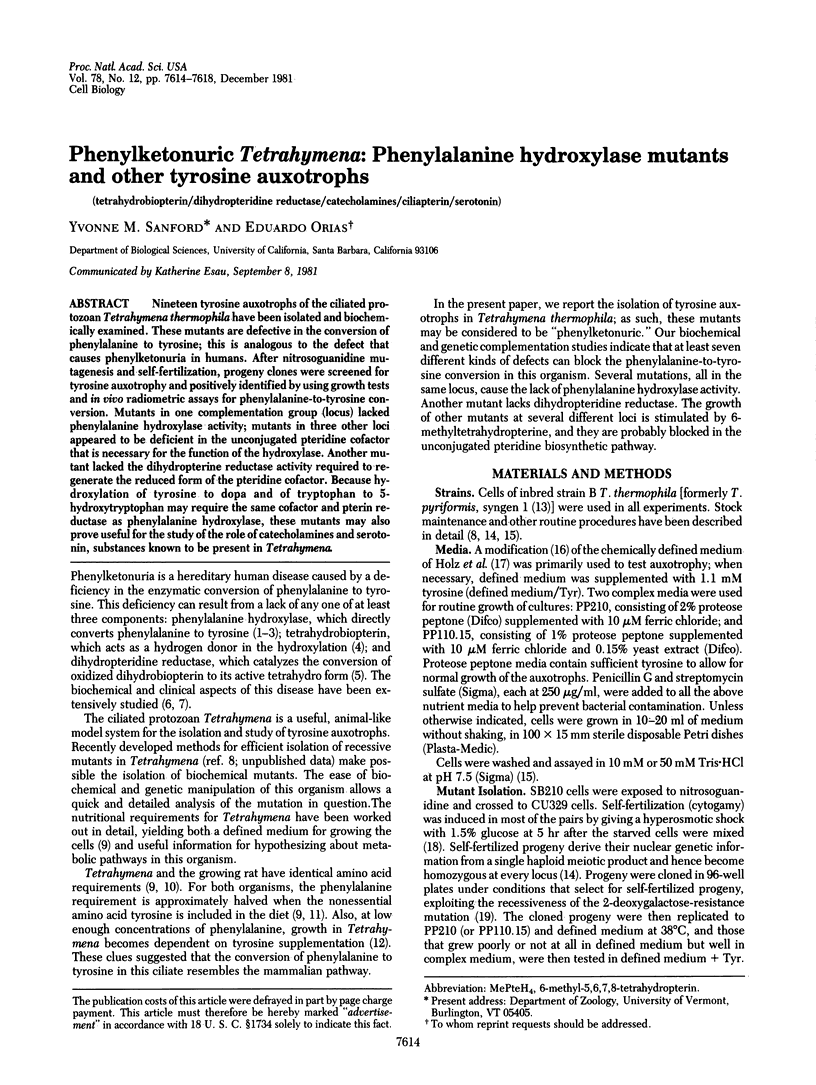
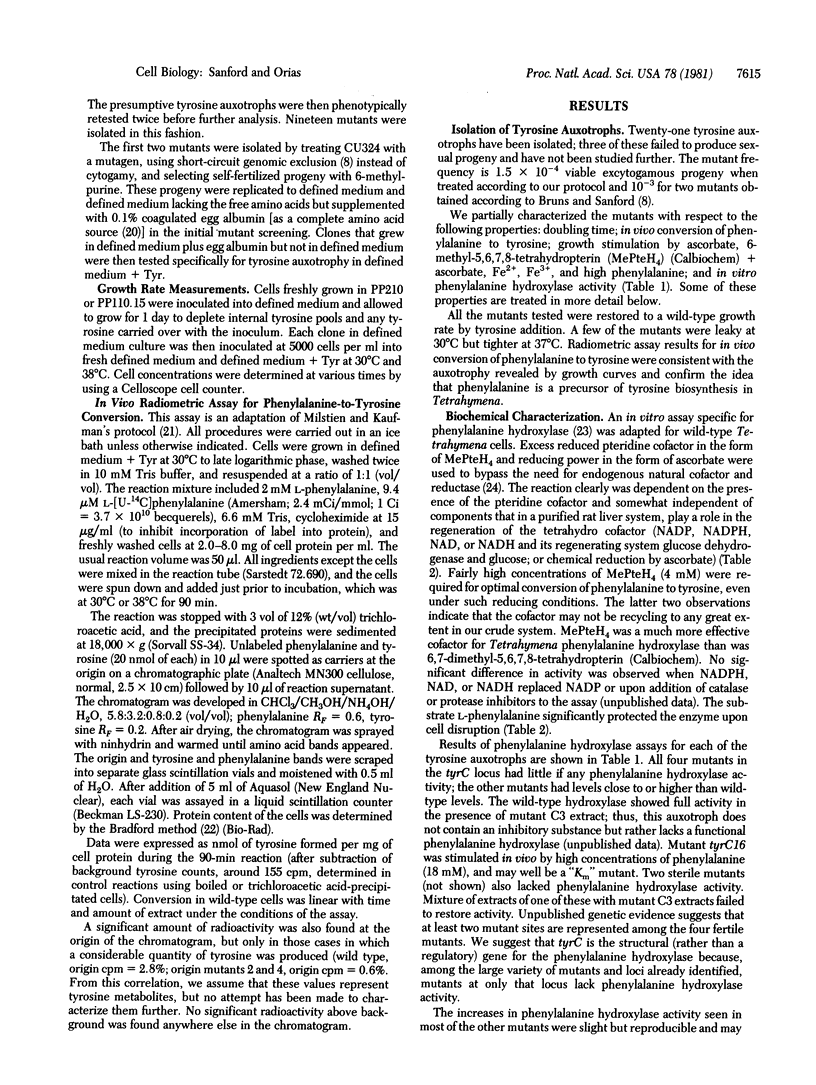
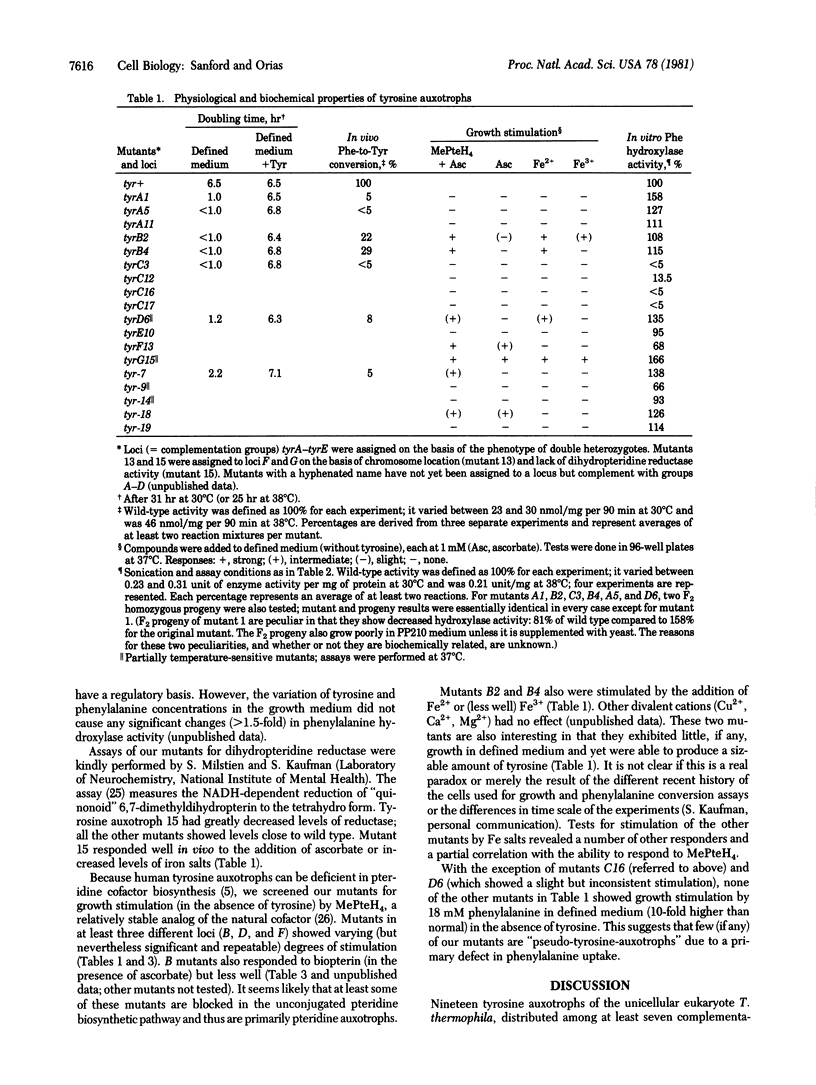
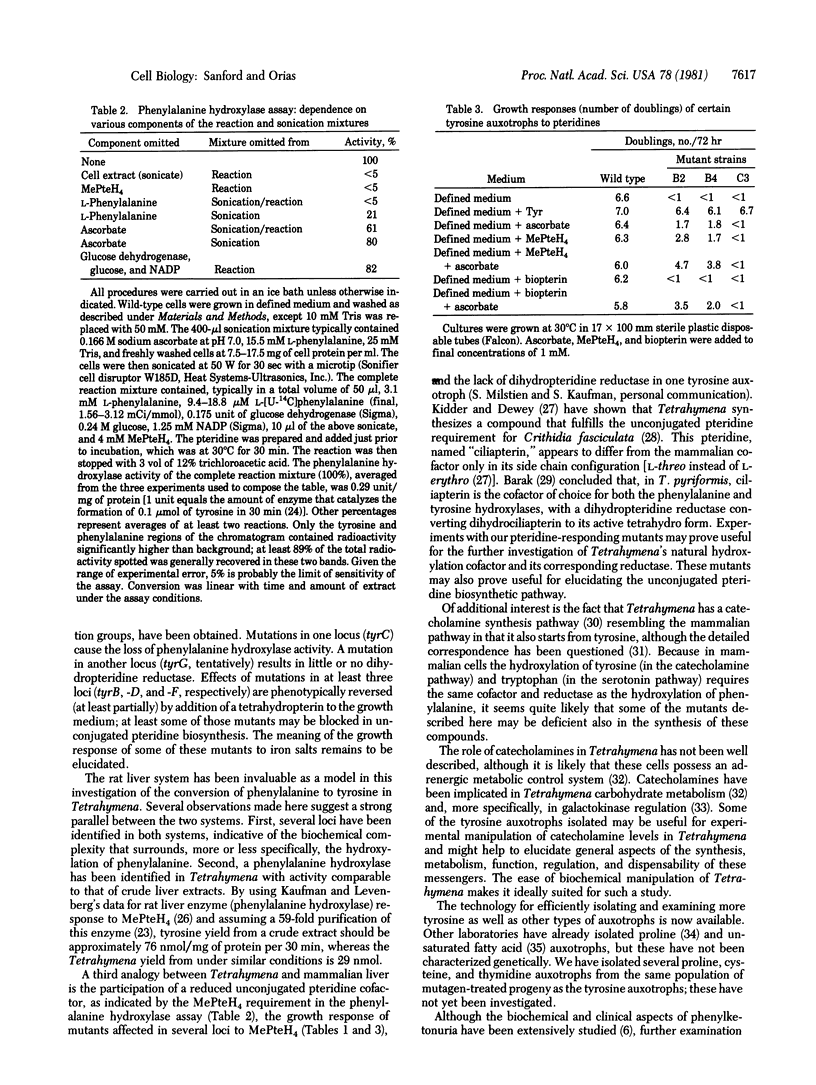
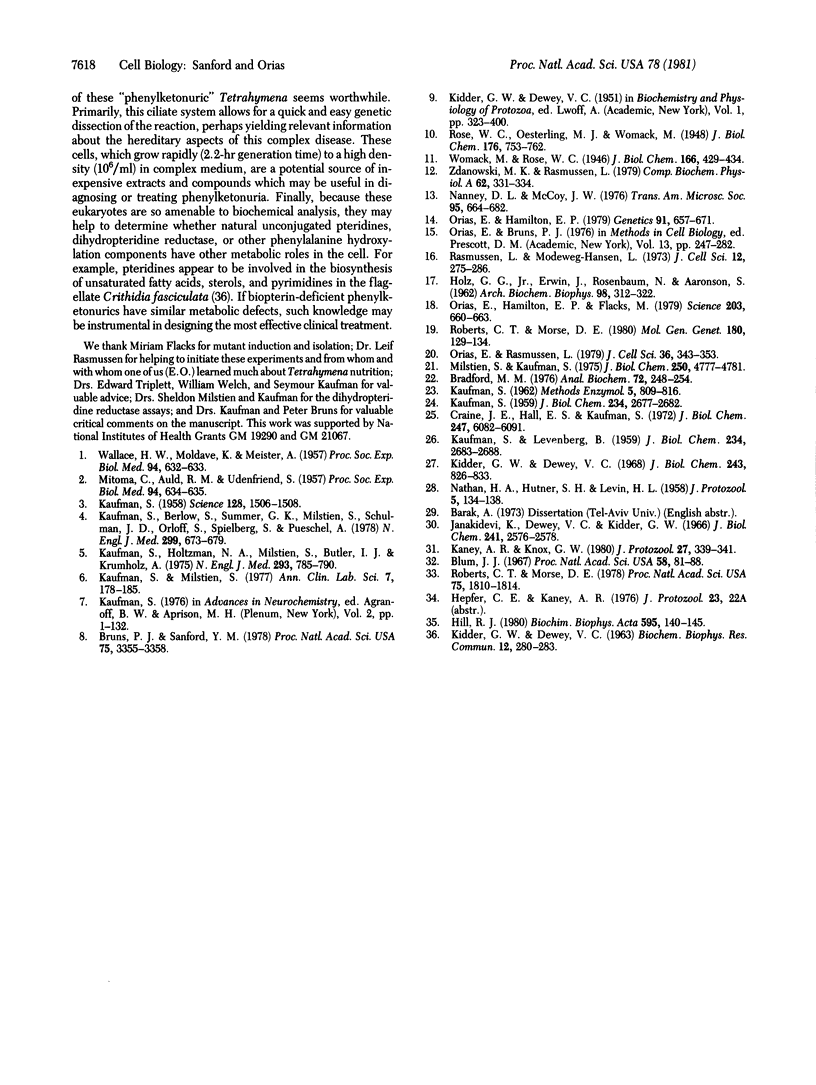
Selected References
These references are in PubMed. This may not be the complete list of references from this article.
- Blum J. J. An adrenergic control system in Tetrahymena. Proc Natl Acad Sci U S A. 1967 Jul;58(1):81–88. doi: 10.1073/pnas.58.1.81. [DOI] [PMC free article] [PubMed] [Google Scholar]
- Bradford M. M. A rapid and sensitive method for the quantitation of microgram quantities of protein utilizing the principle of protein-dye binding. Anal Biochem. 1976 May 7;72:248–254. doi: 10.1006/abio.1976.9999. [DOI] [PubMed] [Google Scholar]
- Bruns P. J., Sanford Y. M. Mass isolation and fertility testing of temperature-sensitive mutants in Tetrahymena. Proc Natl Acad Sci U S A. 1978 Jul;75(7):3355–3358. doi: 10.1073/pnas.75.7.3355. [DOI] [PMC free article] [PubMed] [Google Scholar]
- Craine J. E., Hall E. S., Kaufman S. The isolation and characterization of dihydropteridine reductase from sheep liver. J Biol Chem. 1972 Oct 10;247(19):6082–6091. [PubMed] [Google Scholar]
- HOLZ G. G., Jr, ERWIN J., ROSENBAUM N., AARONSON S. Triparanol inhibition of Tetrahymena, and its prevention by lipids. Arch Biochem Biophys. 1962 Aug;98:312–322. doi: 10.1016/0003-9861(62)90189-3. [DOI] [PubMed] [Google Scholar]
- Hill R. J. Modulation of membrane fluidity in a fatty acid auxotrophe of Tetrahymena thermophila. Biochim Biophys Acta. 1980;595(1):140–145. doi: 10.1016/0005-2736(80)90256-4. [DOI] [PubMed] [Google Scholar]
- Janakidevi K., Dewey V. C., Kidder G. W. The biosynthesis of catecholamines in two genera of protozoa. J Biol Chem. 1966 Jun 10;241(11):2576–2578. [PubMed] [Google Scholar]
- KAUFMAN S., LEVENBERG B. Further studies on the phenylalanine-hydroxylation cofactor. J Biol Chem. 1959 Oct;234:2683–2688. [PubMed] [Google Scholar]
- KAUFMAN S. Phenylalanine hydroxylation cofactor in phenylketonuria. Science. 1958 Dec 12;128(3337):1506–1508. doi: 10.1126/science.128.3337.1506. [DOI] [PubMed] [Google Scholar]
- KAUFMAN S. Studies on the mechanism of the enzymatic conversion of phenylalanine to tyrosine. J Biol Chem. 1959 Oct;234:2677–2682. [PubMed] [Google Scholar]
- KIDDER G. W., DEWEY V. C. RELATIONSHIP BETWEEN PYRIMIDINE AND LIPID BIOSYNTHESIS AND UNCONJUGATED PTERIDINE. Biochem Biophys Res Commun. 1963 Aug 1;12:280–283. doi: 10.1016/0006-291x(63)90296-1. [DOI] [PubMed] [Google Scholar]
- Kaney A. R., Knox G. W. Production of melanin precursors by a mutant of Tetrahymena thermophila. J Protozool. 1980 Aug;27(3):339–341. doi: 10.1111/j.1550-7408.1980.tb04274.x. [DOI] [PubMed] [Google Scholar]
- Kaufman S., Berlow S., Summer G. K., Milstien S., Schulman J. D., Orloff S., Spielberg S., Pueschel S. Hyperphenylalaninemia due to a deficiency of biopterin. A variant form of phenylketonuria. N Engl J Med. 1978 Sep 28;299(13):673–679. doi: 10.1056/NEJM197809282991301. [DOI] [PubMed] [Google Scholar]
- Kaufman S., Holtzman N. A., Milstien S., Butler L. J., Krumholz A. Phenylketonuria due to a deficiency of dihydropteridine reductase. N Engl J Med. 1975 Oct 16;293(16):785–790. doi: 10.1056/NEJM197510162931601. [DOI] [PubMed] [Google Scholar]
- Kaufman S., Milstien S. Phenylketonuria and its variants. Ann Clin Lab Sci. 1977 Mar-Apr;7(2):178–185. [PubMed] [Google Scholar]
- Kidder G. W., Dewey V. C. A new pteridine from Tetrahymena. J Biol Chem. 1968 Feb 25;243(4):826–833. [PubMed] [Google Scholar]
- MITOMA C., AULD R. M., UDENFRIEND S. On the nature of enzymatic defect in phenylpyruvic oligophrenia. Proc Soc Exp Biol Med. 1957 Apr;94(4):634–635. doi: 10.3181/00379727-94-23034. [DOI] [PubMed] [Google Scholar]
- Milstien S., Kaufman S. Studies on the phenylalanine hydroxylase system in liver slices. J Biol Chem. 1975 Jun 25;250(12):4777–4781. [PubMed] [Google Scholar]
- Nanney D. L., McCoy J. W. Characterization of the species of the Tetrahymena pyriformis complex. Trans Am Microsc Soc. 1976 Oct;95(4):664–682. [PubMed] [Google Scholar]
- Orias E., Bruns P. J. Induction and isolation of mutants in Tetrahymena. Methods Cell Biol. 1976;13:247–282. [PubMed] [Google Scholar]
- Orias E., Hamilton E. P. Cytogamy: An Inducible, Alternate Pathway of Conjugation in TETRAHYMENA THERMOPHILA. Genetics. 1979 Apr;91(4):657–671. doi: 10.1093/genetics/91.4.657. [DOI] [PMC free article] [PubMed] [Google Scholar]
- Orias E., Hamilton E. P., Flacks M. Osmotic shock prevents nuclear exchange and produces whole-genome homozygotes in conjugating Tetrahymena. Science. 1979 Feb 16;203(4381):660–663. doi: 10.1126/science.760210. [DOI] [PubMed] [Google Scholar]
- Orias E., Rasmussen L. Dual capacity for nutrient uptake in Tetrahymena. V. Utilization of amino acids and proteins. J Cell Sci. 1979 Apr;36:343–353. doi: 10.1242/jcs.36.1.343. [DOI] [PubMed] [Google Scholar]
- Rasmussen L., Modeweg-Hansen L. Cell multiplication in Tetrahymena cultures after addition of particulate material. J Cell Sci. 1973 Jan;12(1):275–286. doi: 10.1242/jcs.12.1.275. [DOI] [PubMed] [Google Scholar]
- Roberts C. T., Jr, Morse D. E. Galactokinase-deficient mutants of Tetrahymena thermophila: selection and characterization. Mol Gen Genet. 1980;180(1):129–134. doi: 10.1007/BF00267361. [DOI] [PubMed] [Google Scholar]
- Roberts C. T., Jr, Morse D. E. Genetic regulation of galactokinase in Tetrahymena by cyclic AMP glucose, and epinephrine. Proc Natl Acad Sci U S A. 1978 Apr;75(4):1810–1814. doi: 10.1073/pnas.75.4.1810. [DOI] [PMC free article] [PubMed] [Google Scholar]
- WALLACE H. W., MOLDAVE K., MEISTER A. Studies on conversion of phenylalanine to tyrosine in phenylpyruvic oligophrenia. Proc Soc Exp Biol Med. 1957 Apr;94(4):632–633. doi: 10.3181/00379727-94-23033. [DOI] [PubMed] [Google Scholar]


